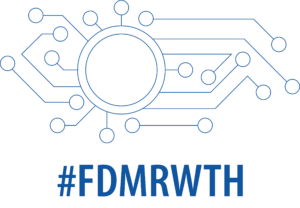At its meeting on June 18, 2024, the rectorate of RWTH Aachen approved the new version of the RDM guideline on the recommendation of the RDM advisory board. In this article, we discuss the background and the most important innovations of the new guideline.
The new RDM guideline at RWTH replaces the previous version of March 8, 2016. While the content of the previous version is still fundamentally correct, the topic of research data management (RDM) has developed significantly since 2016, especially at RWTH.
For example, the previous version lacked references to the FAIR Data Principles and the National Research Data Infrastructure (NFDI), in whose development RWTH is playing a prominent role.
The new version of the guideline mentions these developments and expresses the dynamics of progress in the field of RDM at RWTH. It offers the opportunity, also with a view to the current round of the Excellence Strategy, to give the topic an internal and external impetus that does justice to its strategic importance for RWTH.
The new version reflects the discussions within the RDM team, with the heads of department 4 – Research, IT Center and University Library and in the RDM advisory board. It is based on comparisons with the updated documents of other universities in Germany as well as the recommendations of the “Research Data Policy Kit” from the BMBF project “FDMentor”. The main innovations of the guideline include the following aspects.
Key Changes to the Guideline
- The term ‘research data’ is defined in line with the broad understanding of the term used by the DFG. This includes not only digital research data but also physical artefacts.
- This document is of an advisory nature. Only the cited legal bases are binding. This is now explicitly stated in the text.
- References to the FAIR Principles and the NFDI have been added.
- The importance of documenting decisions in the research process and in the handling of research data is now stated and emphasized.
- RDM is often perceived as a set of guidelines and ideals that cannot be put into practice by researchers. Against this background, it is important to emphasise the degrees of freedom in the design of RDM. Decisions about their use should be made consciously and documented.
- Finally, responsibilities for RDM are addressed in the new version of the guideline. The central IT Center and the university library of RWTH Aachen provide the basic technical infrastructure and offer advice and training. However, the responsibility for the actual implementation in research projects lies with the researchers.
Find Out More
If you have any questions about the new RDM guidelines or about RDM in general, simply write a message to the RDM team. We look forward to hearing from you.
Responsible for the content of this article is Florian Claus.






Leave a Reply
You must be logged in to post a comment.